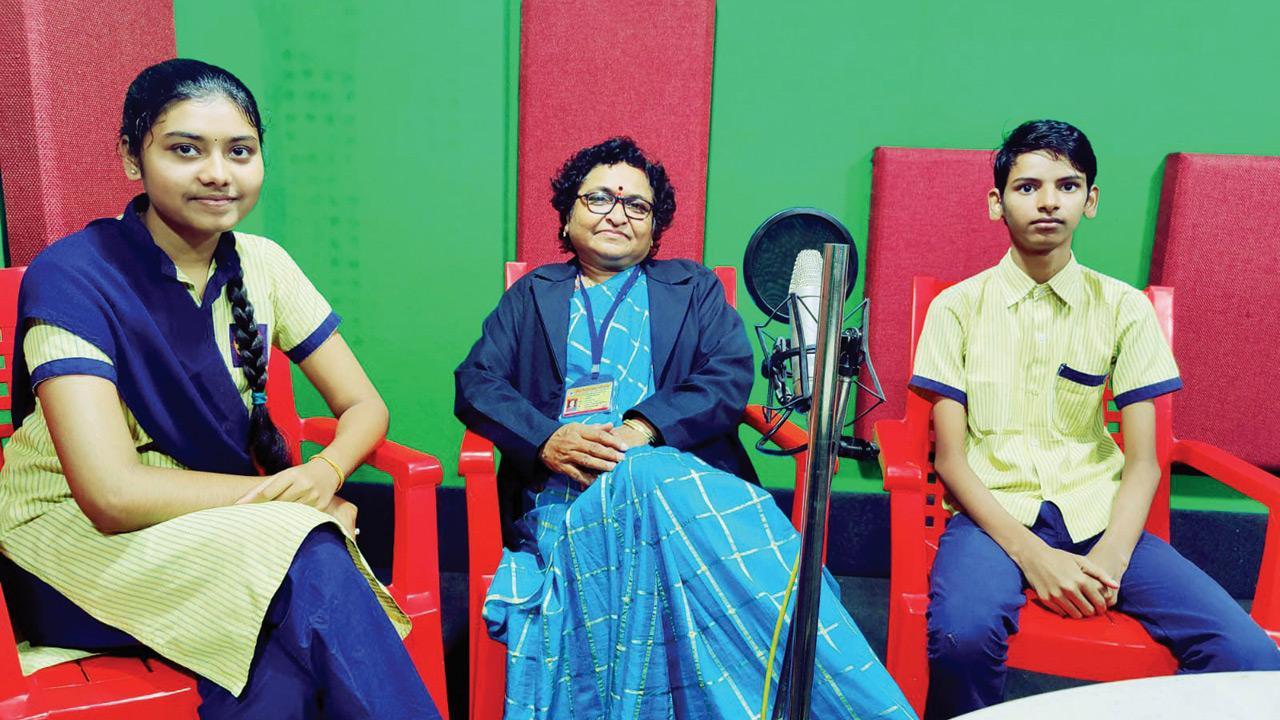When a zilla parishad school teacher creates a jingle to teach her students Newton’s Law, they are sure to listen. A Nashik community radio station has bagged an award for making education free and accessible to the most vulnerable students bang in the middle of the pandemic

Sarita Pachpande, who teaches students of classes IX and X, in a recording studio with 15-year-olds Anand Sutar and Shweta Edke
In Vaitarna, in Nashik’s Igatpuri town, a group of zilla parishad school students form a circle, jotting down notes as they listen to a Marathi diction lesson via a portable radio device that sits on a chair placed in the centre. This radio is one of hundreds distributed among schools following a crowd-funding effort to reach out to the vulnerable families and their children in the region. These radio devices are critical for those students who don’t have Internet access to continue their classes in the pandemic. Close to 150 teachers of municipal and zilla parishad schools in the area are behind the initiative, and their work saw fruition during the height of the Coronavirus pandemic in June 2020.
ADVERTISEMENT
When the nationwide lockdown was imposed in March 2020, the education sector like so many others, was impacted overnight. Kids were to be cooped up at home, indefinitely. Venturing out would mean making yourself vulnerable to an infection that was clearly contagious and fatal, with no scientific evidence yet about how gravely it affected kids. Teachers, on the other hand, were growing restless. “Private and aided schools swiftly moved their lectures online. What would happen to kids who couldn’t afford a tablet, laptop or smartphone? Or those whose families owned only one phone that one of their parents took to work?” asks Ruchita Thakur, 24.
Most students in zilla parishad schools across India could not afford to buy mobile phones or laptops for e-learning
Thakur is programme coordinator for Radio Vishwas 90.8, Nashik’s first and only community radio station that arrived as an answer to the above questions. Thakur remembers a group of concerned teachers reaching out to her family-run radio station one day to seek help. Radio Vishwas is run by the Vishwas Dhyan Prabodhini and Research Institute, Nashik. “My father, Vishwas Thakur, started the station with the intention of addressing community issues. When the teachers came to us, we suggested recording lectures and broadcasting them to students in Nashik district via radio,” she remembers.
In two months, Radio Vishwas 90.8 launched Shikshan Sarvansathi (Education for all), and promised to offer free classes to students of Class III to Class X. Audio lectures were aired via distributed devices in zilla parishad and Nashik Municipal Corporation (NMC) schools. “These are students who are trapped in poverty and cannot afford smartphones for digital education. The content was developed for students of all divisions across subjects and the programmes were broadcast in various languages, including Hindi, English, Marathi and Sanskrit,” says Thakur.
Thakur explains that each chapter is covered in a recording of 15 to 20 minutes. Sarita Pachpande, 50, one of the ZP school teachers who is part of this initiative, says, “I teach science and mathematics to kids in Class IX and X. Complex subjects are tough to teach on audio. Also, let’s not forget that these two years are the most crucial in secondary school, so we had to ensure that our recordings were simple for the students to understand. For instance, Newton’s Law is a complicated principle, but I used songs and jingles to translate the theory into audio recordings. I made it fun. And it worked; all my students aced the topic.”
Class X students Anand Sutar and Shweta Edke agree. While Sutar tells us adapting to this method of learning took time, Edke, 15, thinks that the pandemic turned out to be a boon. “It [the pandemic] gave us an opportunity to learn new topics in modern ways. We have all thoroughly enjoyed the experience of learning via radio.”
According to Radio Vishwas, a total of 60,000 students have benefited from this project. Kids who could not afford to buy an FM radio were given the device free of cost. “Teachers raised funds amounting to approximately Rs 2 lakh to buy the device for the most vulnerable groups of children,” Thakur smiles.
To amplify the reach, the lectures were also shared with six other community radios in Maharashtra. The effort has paid off. Radio Vishwas recently won two awards at the 8th edition of the National Community Radio Awards instituted by the Ministry of Information and Broadcasting. The team bagged first prize in the Sustainability Model Awards category, and second prize in the Thematic Awards category for its radio programme—Education for all”.
 Subscribe today by clicking the link and stay updated with the latest news!" Click here!
Subscribe today by clicking the link and stay updated with the latest news!" Click here!






